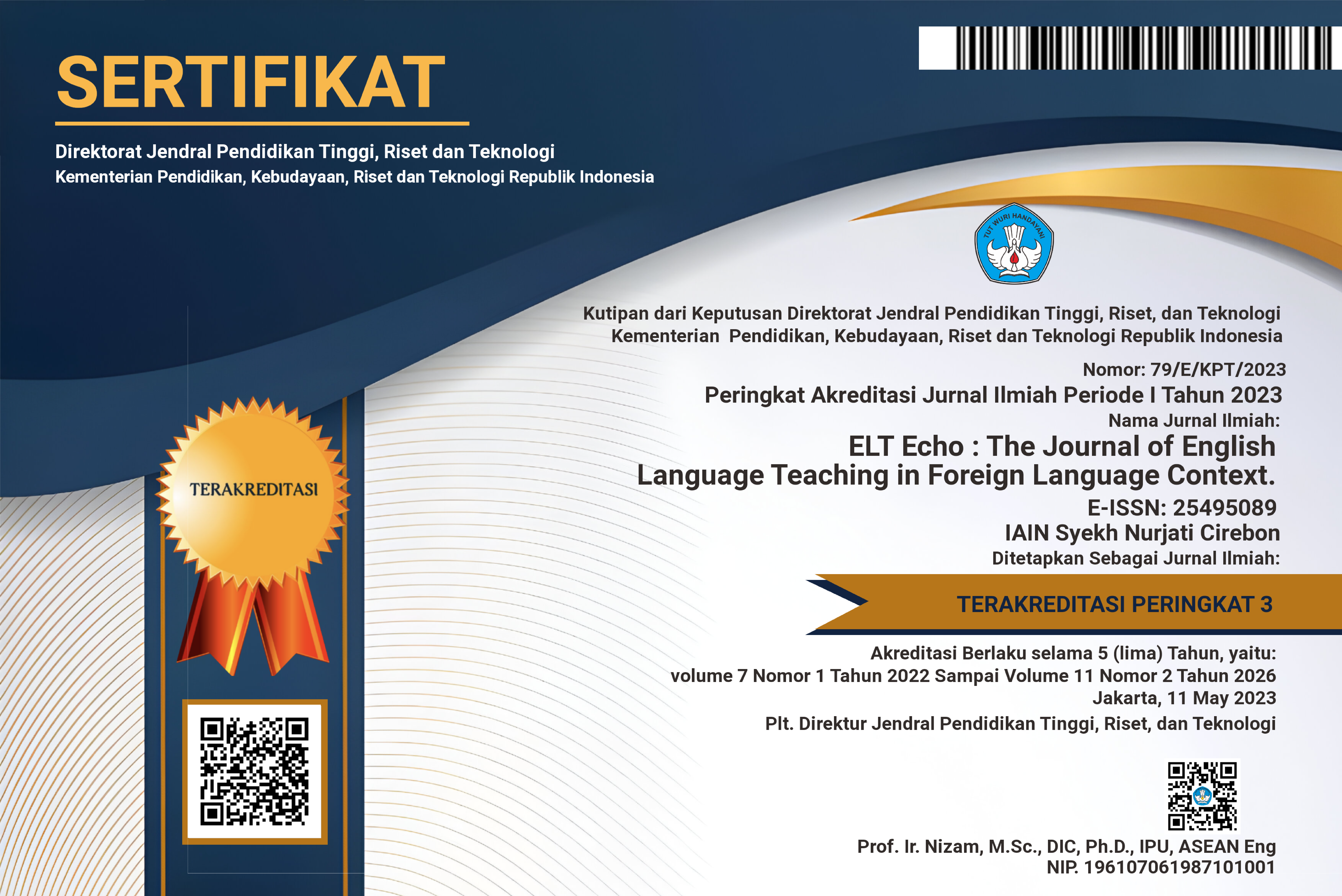THAI TEACHERS’ ATTITUDES TOWARDS ENGLISH AS A LINGUA FRANCA: A LONGITUDINAL STUDY
(1) Chiang Mai Rajabhat University
(2) Chiang Mai Rajabhat University
(*) Corresponding Author
Abstract
Keywords
Full Text:
PDFReferences
Baker, W. (2012). English as a lingua franca in Thailand: Characterisations and implications. English in Practice, 1, 18-27.
Chen, R. T. (2022). Teaching intercultural communication in an English as a lingua franca context. RELC Journal, 1-9. https://doi.org/10.1177/00336882221074106
Cheung, C., & Sung, M. (2016). Does accent matter? Investigating the relationship between accent and identity in English as a lingua franca communication. System, 60, 55-65.
Curran, J. E., & Chern, C. (2017). Pre-service English teachers’ attitudes towards English as a lingua franca. Teaching and Teacher Education, 66, 137-146.
Dornyei, Z., Csizer, K., & Nemeth, N. (2006). Motivation, language attitudes and globalisation: A Hungarian perspective. Clevedon: Multilingual Matters.
Holliday, A. (2005). The struggle to teach English as an international language. Oxford: Oxford University Press.
Jenkins, J. (2007). English as a lingua franca: Attitude and identity. Oxford University Press.
Jenkins, J. (2009). English as a lingua franca: Interpretations and attitudes. World Englishes, 28(2), 200-207. https://doi.org/10.1111/j.1467-971X.2009.01582.x
Kachru, B. B. (2005) Asian Englishes: Beyond the canon. Hong Kong: Hong Kong University Press.
Kaur, P. (2014a). Attitudes towards English as a lingua franca. Procedia-Social and Behavioral Sciences, 118, 214-221.
Kaur, P. (2014b). Accent attitudes: Reactions to English as a lingua franca. Procedia-Social and Behavioral Sciences, 134, 3-12.
Kaypak, E., & Ortactepe, D. (2014). Language learner beliefs and study abroad: A study on English as a lingua franca (ELF). System, 42, 355-367.
Kelman, H. C. (1961). Processes of opinion change. The Public Opinion Quarterly, 25(1), 57-78.
Kimura, D. (2017). Changing orientations to English during English-medium study abroad in Thailand. In P. Clements, A. Krause, & H. Brown (Eds.), Transformation in language education (pp. 188-194). JALT.
Leung, C., & Jenkins, J. (2020). Mediating communication-ELF and flexible multilingualism perspectives on the Common European Framework of Reference for Languages. Australian Journal of Applied Linguistics, 3(1), 26-41. https://doi.org/10.29140/ajal.v3n1.285
Lim, I., & Hwang, J. (2019). Korean adult English learners’ perceptions of the common grammatical features of English as a lingua franca. The Journal of Asia TEFL, 16(3), 876-893. http://dx.doi.org/10.18823/asiatefl.2019.16.3.7.876
Luo, W. (2018). A study of Taiwanese university students’ English use, learning goals and attitudes towards English as a lingua franca. Studies in Second Language Learning and Teaching, 8(4), 775-794.
Matsuda, A., & Friedrich, P. (2011). English as an international language: A curriculum blueprint. World Englishes, 30(3), 332-344. https://doi.org/10.1111/j.1467-971X.2011.01717.x
Mikeladze, T., & Hariri, K. (2018). Teachers’ attitudes toward ELF (English as Lingua Franca) in the UAE and Georgia. Journal of Education in Black Sea Region, 3(2), 10-19.
Nordquist, R. (2020). English as a lingua franca (ELF). Retrieved March 26, 2019, from https://www.thoughtco.com/english-as-a-foreign-language-efl-1690597
Ortactepe, D. (2012). The development of conceptual socialization in international students: A language socialization perspective on conceptual fluency and social identity. Cambridge Scholarly Publishers.
Seidlhofer, B. 2001. Closing a conceptual gap: The case for a description of English as a lingua franca. International Journal of Applied Linguistics, 11(2), 133-158. https://doi.org/10.1111/1473-4192.00011
Seidlhofer, B. (2011). Understanding English as a lingua franca. Oxford University Press.
Seidlhofer, B. (2020). Communication and community: An ELF perspective on critical contexts. Lingue e linguaggi, 38, 25-41. https://doi.org/10.1285/i22390359v38p25
Seidlhofer, B., & Widdowson, H.G. (2017). Competence, capability and virtual language. Lingue e Linguaggi, 24, 23-36. https://doi.org/10.1285/i22390359v24p23
Stephens, M. (2021). A Japanese learner’s Sojourn in Croatia to study English as a Lingua Franca. The Journal of Asia TEFL, 18(4), 1432-1439. http://dx.doi.org/10.18823/asiatefl.2021.18.4.23.1432
DOI: 10.24235/eltecho.v7i2.11662
Article Metrics
Abstract view : 18 timesPDF - 5 times
Refbacks
- There are currently no refbacks.
Â
This Journal is indexed by:
Â

This work is licensed under a Creative Commons Attribution 4.0 International License.










